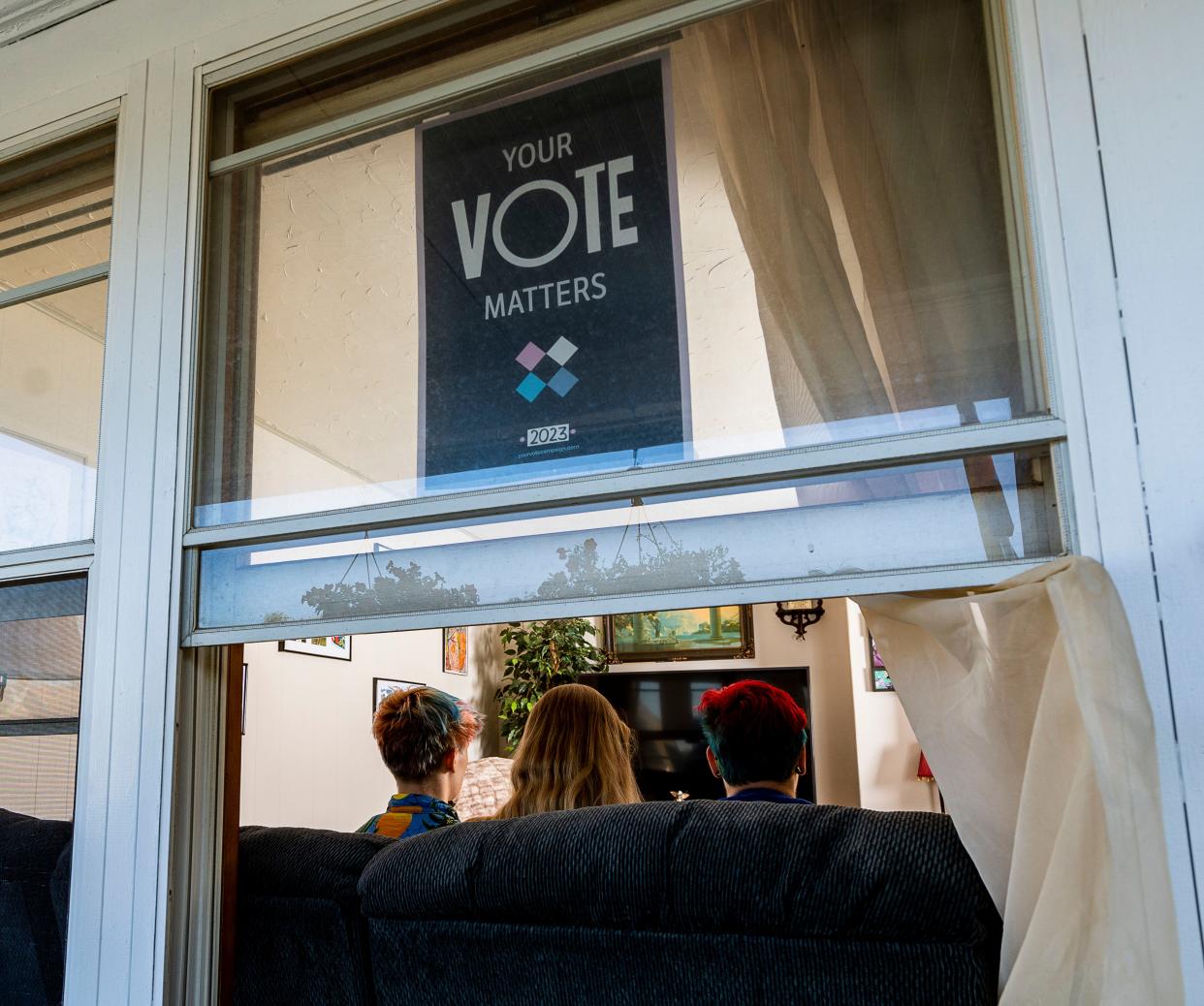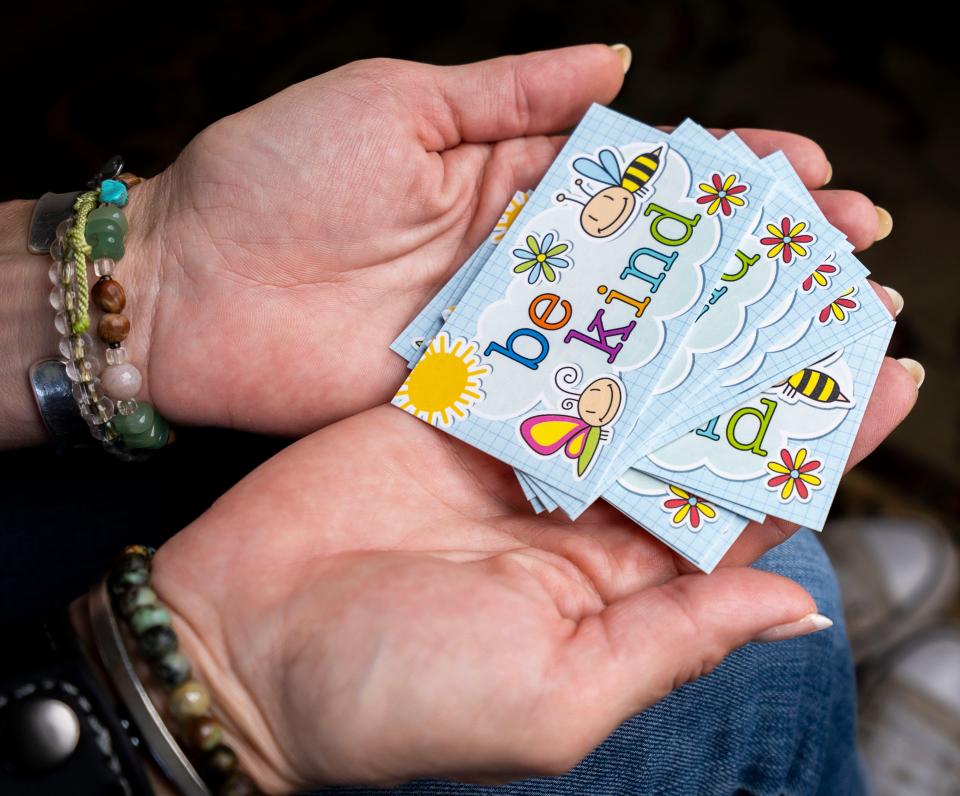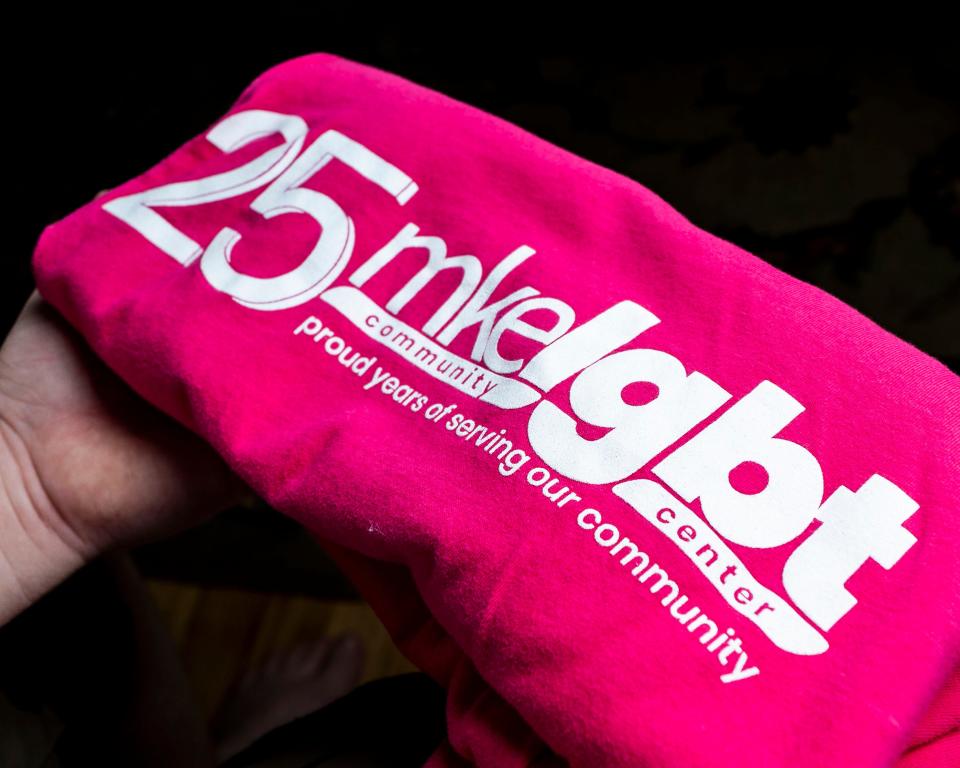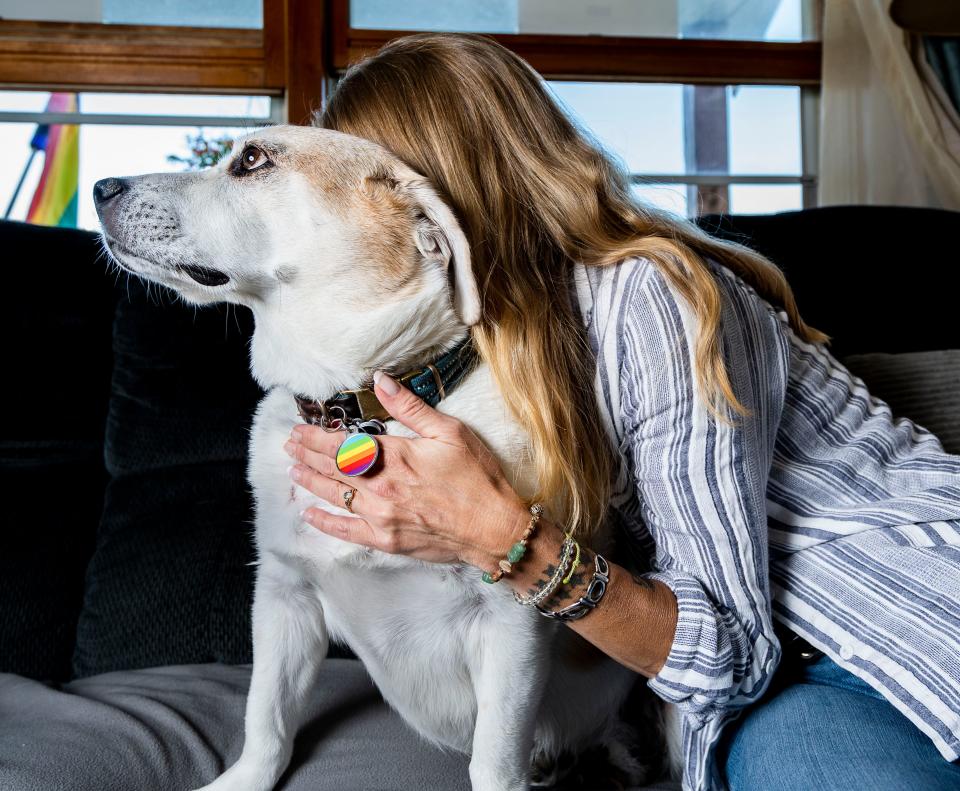Trans kids in Wisconsin say a supportive network is critical in helping them face challenges from school policies, legislation and more

When Killian moved in with his friend’s family in 2022, he couldn’t understand why everyone was so nice to him.
He didn’t get yelled at for making little mistakes.
He wasn’t made to feel like he wouldn’t amount to anything.
And Killian, an 18-year-old trans man, wasn’t misgendered or deadnamed anymore.
Transgender people and their families spoke to the Journal Sentinel for this story on the condition that only their first names be published, out of concern for their safety.
It was a huge change for Killian, who for years had felt confused and alone as he tried to understand why he felt "like I didn't fit in my body."
When he'd come out as transgender, his family wasn't supportive. He was bullied at school.
“For a long time I thought, ‘No, this is wrong, you can’t be this’ because I had my mother on my back telling me how wrong I was,” Killian said. “And at school, people called me slurs, and teachers refused to respect my pronouns and name. There were security guards who would give me dirty looks when I tried to use the bathroom.”
Killian became depressed and eventually began doing drugs and wanted to drop out of school.
When Killian was 17, a supportive teacher encouraged him to go to the Milwaukee LGBT Community Center. That’s where he met Isaiah, who was 16 at the time and also trans.
Isaiah’s mom, Drea, was supportive of her son’s gender identity, and when Killian and his family were evicted in 2022, Drea invited Killian to move in.
Drea helped him quit drugs and switch schools so he could graduate early. She also helped him get his name legally changed, after which she hosted a celebration, complete with a cake with Killian’s name on it.
“At the courthouse after I got my name legally changed, I was hugged by Drea, and I just started crying,” Killian said. “I had waited for so long that it was like I never really expected it to happen. It was just so overwhelming in a good way, and I had people around to celebrate with me.”
Killian's journey shows the difference between receiving support and living in a world making rules against that support. Experts say that receiving gender-affirming care — the social, psychological and medical support that people receive when their gender identity does not match their sex assigned at birth — is crucial in supporting the mental health and bodily autonomy of transgender and gender-nonconforming people.
This reporting is part of our Kids in Crisis series, which is examining students' experiences as they face historically high levels of anxiety, depression and suicidal ideation. Those numbers are even higher for LGBTQ kids who don't feel support from their families and schools — a situation that has been exacerbated by an antitrans political climate over the past few years.

'You shouldn't have to want to kill yourself because you just want to be who you are'
Gender-affirming care for transgender people, especially minors, has been under fire for the past few years, as dozens of bills have been introduced and several passed in states nationwide, preventing minors from receiving puberty blockers, hormones and surgeries.
In Wisconsin, three Republican state legislators recently introduced a bill that, according to the Legislative Reference Bureau's analysis, would prohibit health care providers from medical interventions for people younger than 18 that are done "for the purpose of changing the minor's body to correspond to a sex that is discordant with the minor's biological sex." This would include a ban on puberty blockers, gender-affirming hormone therapy and gender-affirming surgeries.
Additionally, several school board policies have been enacted that make social transition — actions like changing names, pronouns, clothing and hairstyles to match a person's gender identity — more difficult for transgender children. For many trans children who are not accepted by their families, school is a refuge. These policies can make them feel like they're not accepted anywhere.
"For so many kids who are trying to figure themselves out, to be told by everyone that they can't be who they are, over time, it beats them down," Killian said. "You shouldn't have to want to kill yourself because you just want to be who you are. People are trying to take that away from you, and it's not OK. It's not."
Wisconsin's Kids in Crisis: How do Wisconsin educators close the academic gap? Start with student mental health.
'When you're in a state like that, you can't focus on anything else'
Several school districts in southeast Wisconsin, including Waukesha, Muskego and Arrowhead, have passed policies that require parental permission before a student can use different names or pronouns at school.
This goes against recommended school policies championed by GLSEN — an organization that advocates for LGBTQ+ inclusive schools — and the Wisconsin Department of Public Instruction, which advise that students' consent be secured before disclosing changes in names or pronouns to parents. Parents might not be supportive, or a child might not be ready to come out at home.
School districts such as Waukesha, Oak Creek-Franklin and Kettle Moraine have also passed policies that prohibit teachers from displaying Pride flags in their classrooms or posting “safe space” stickers that indicate to LGBTQ+ students that their gender and sexuality will be respected.
"When I was in my unsupportive school, I would have to tell every teacher every semester that my name and pronouns were different than what was in their records," Killian said. "There was one teacher who kept deadnaming me, and they wouldn't stop even when I didn't answer to that name; they just marked me absent. I got so upset that I was just shaking. And when you're in a state like that, you can't focus on anything else."
More: A year at Carmen Northwest: a student death, exodus of teachers and a quashed protest

'We can choose to make their lives difficult or be the ones to ease their burdens'
Many parents support their children but are uncertain of how to show that support.
Heather and Jamie are the moms of 5-year-old Elijah, a trans girl. Heather has been active in the LGBTQ community for years and has always been open to letting her children choose how to express themselves. But she was caught off guard by her feelings when Elijah chose a dress off the rack of a store when she was a toddler.
“She wanted that outfit, and we had come to the store to buy clothes for her. Was I supposed to tell her no?” Heather said. “It was the weirdest thing for me because I didn’t think I would be that way. I had this internal fight because I was so worried about what everyone else would think.”
Heather and Jamie did let Elijah get the dress, and they supported her when she told them she is a girl, allowing her to wear the clothes she wants and reinforcing to her teachers that Elijah uses she/her pronouns — all elements of supporting a trans child through a social transition.
As a result, they say, Elijah now experiences gender euphoria — feeling "right" in your gender.
“There’s so much sparkle to Elijah, but Jamie used to point out that when we would take pictures, Elijah would have dead eyes,” Heather said, “until she started wearing dresses in the pictures; that’s when her eyes lit up.”
And when Heather asked Elijah’s permission to share her story, she said, “Yes, because it would be good for other parents to know how amazing I am.”

Need more help with mental health questions? The Milwaukee Resource Guide is here to help. Have something you want answered? Submit a question.
Desmond, a 23-year-old trans man, realized when he was young that he didn’t fit in with girls, but he didn’t have the language to explain what he was feeling. When he first understood he was transgender, he changed how he dressed, changed his hairstyle, started going by a nickname and changed his pronouns at school.
He also came out to his mom, Becky, in a letter when he was about 12 or 13.
“I remember being actively concerned about wanting to show him I was supportive but also being really thrown for a loop,” Becky said. “There was this moment of, ‘Wow, that’s a big thing,’ and ‘How did I miss this about my kid?’”
Becky realized she had always had an inkling that Desmond was trans, and was glad he had felt supported enough to tell her. But she also admits to wondering at the time whether Desmond was sure.
Desmond doesn’t remember Becky expressing that uncertainty to him, but it’s still something Becky thinks about.
Becky said her moment of thinking, “are you sure?” about Desmond’s gender identity wasn’t because she wanted to talk him out of his identity or to discourage him.
“I think the heart of it was that I wanted him to have an easier life, and I wanted him to be safe,” she said.
As she’s processed her reaction over the years, she’s turned the scenario around in her head and realized that asking a trans child to explain themselves when they share their gender identity is offensive to both their autonomy and their ability to know who they are.
“There wasn’t a time where I knew I was a girl,” Becky said. “If someone had asked me if I was sure, or when I knew I was a girl, it would have been like, ‘It’s always been there.’ I would tell myself then and tell other parents now who wonder how their trans kids know their gender identity: ‘Maybe they don’t have an answer that you understand, but you don’t have that answer about yourself either. It’s just something you know in your soul.’
“We can choose to make their lives more difficult or to be the one who eases their burdens. I had to realize that, in questioning my kid, I was going to be the thing making his life more difficult.”

'How can I be there the best I can for my kid?'
When Desmond came out to Becky, she wasn’t sure initially how to help him. She did her own research to learn more about gender identity. She also reached back to the lessons she had learned from her own parents; although they didn’t raise a trans child, they modeled acceptance with the lesson of “whatever issue is in front of your kid, this is where my child needs support.” Becky also found a gender-affirming therapist for Desmond.
“What I probably should have done that I didn’t do was get a therapist for myself to work through some of those questions,” Becky said.
Lynn Dusold and David Bedrin, therapists at Pathways Counseling Center, said it's important for the whole family to get therapy when a child comes out as trans. Kids need to know they have a supportive environment in which to figure out how to navigate their lives as trans people. Parents need to know they're not alone in learning how to offer that support. And families need to build trust to have sometimes difficult conversations.
“I run a parent support group, and they’re grappling with their own stuff, trying to figure things out,” Dusold said. “What they all really care about is, ‘How can I be there the best I can for my kid?’”
Bex Streit is the transgender and gender-nonconforming program coordinator for the Milwaukee LGBT Community Center. The center started a support group for trans children younger than 13 and their parents.
“It’s not that they’re looking for medical resources at that age. This is a space to provide social support,” Streit said. “The kids are looking for other kids like them, and the parents are looking for other parents to talk through the unique situations they’re in.”
One thing parents have to deal with is the concern that they missed something important about their children’s identity. For some parents, it’s difficult to believe their child is really trans because it seems to “come out of nowhere.”
That can be exacerbated when kids don’t completely understand their feelings yet. Annie, an 18-year-old trans woman who has been supported by both her parents and her school, thought her feelings of gender incongruence when she was a child were “just what everyone feels”; it wasn’t until she was a teenager that she understood she was trans.
And Killian — who had never been taught that transgender people exist — said he initially tried to "get rid of my feelings" by dressing "overly feminine." Later, when he understood that he was transgender, his mother didn't believe him because she remembered his "overfeminine" stage of life.
“My experience is that a lot of parents didn’t see it coming. And that’s because trans kids have been thinking about it, researching, working with different names to see what fits, all before they try to come out,” Dusold said. “By the time parents learn their kids’ identity, they have two or three years they have to catch up to.”

'You're being seen as yourself, and that's something everyone deserves.'
Most kids' lives revolve around home and school. When their identities aren't affirmed in those two environments, they need to find places where they do feel supported.
"All aspects of our lives are connected, and if you're feeling supported in one area, then it's going to absolutely boost all of the others," Desmond said. "When you're not supported in some of those areas, just having support in one area helps out the others. It helps because then you feel like you're being seen as yourself, and that's something everyone deserves."
Erica Steib is the coordinator of PRISM Program, which staffs a "warmline" for LGBTQ+ youth in Wisconsin to call when looking for mental health support from certified peer specialists. When trans people call, PRISM peer specialists help them identify the people in their lives who are supportive, even when they don't think there's anyone.
"We help people think about who is in their corner because having support from someone helps build protectiveness and provides barriers to self-harm and suicide," Steib said. "We help them think about all the relationships in their lives and who might be safe. And if they don't have those connections, we help them find resources in the community where they might find those people."
For Killian, the support he needed was in his found family and in Milwaukee's LGBTQ community.
"The first time I went to the Pride parade, I cried. And the first time I went to the LGBT Community Center, I cried," Killian said. "It just hit me that everyone who was there was part of my community. I had always dealt with having no support, and that was the first time I realized I was in a safe place."
And, although those supportive people are not always the trans child's parents, sometimes, through therapy, education and a change of perspective, the parents can become that support system for the child. And, in the end, a strengthened relationship is better for both parent and child.
"Whoever they are, that's the person you get to love, and you can make the choice not to be the person who loves them," Becky said. "But, man, what a huge mistake to lose out on who that child is."
In the Kids in Crisis series, reporters from across the USA TODAY NETWORK - Wisconsin examine the stressors that are affecting youth mental health in the wake of the pandemic. The stories will run throughout the school year.
Contact Amy Schwabe at amy.schwabe@jrn.com.
This article originally appeared on Milwaukee Journal Sentinel: Wisconsin transgender youth say gender affirmation is essential

